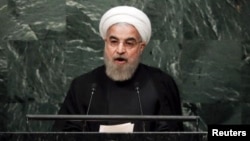Iranian President Hassan Rouhani said Monday that the nuclear deal agreed to between the six major powers and Tehran should signal a new era and help lead to peace and stability in the Middle East.
Speaking at the annual gathering of world leaders at the United Nations General Assembly, Rouhani said the nuclear deal is “not the final objective, but a development which can and should be the basis of further achievements to come.”
He said Iran would not forget the international sanctions imposed on it, but is eager to show it can choose a “lasting peace based on development and shared interests.”
Sanctions, a Test, Not Just a Punishment
Speaking ahead of the Iranian leader, U.S. President Barack Obama said targeted sanctions against Iran were not simply to punish the government, but to “test whether Iran could change course, accept constraints, and allow the world to verify that its nuclear program will be peaceful.”
“If this deal is fully implemented,” Obama added, “the probation on nuclear weapons is strengthened, a potential war is averted; our world is safer.” He said this is the strength of the international system when it works properly.
Under the agreement signed in Vienna in July, Iran pledged to scale back its uranium-enrichment activities and take other action to guarantee that it is not building a nuclear bomb. Tehran also agreed to permit thorough inspections of its facilities devoted to nuclear research and production. In exchange, the United States and its allies will ease the sanctions that have wrecked the Iranian economy.
Implementation
U.S. Secretary of State John Kerry and Iranian Foreign Minister Mohammad Javad Zarif joined their counterparts from Britain, China, France, Russia and Germany for what Kerry called a "good meeting" Monday in New York on implementing the agreement.
European Union foreign policy chief Federica Mogherini, who chaired the talks, said she was encouraged that many leaders speaking at the U.N. described the deal as an example of successful diplomacy and that investing time in dialogue can bring "important results."
"This deal that has been reached constitutes the first step or the first page for a different kind of international and regional relations for Iran," she said. "Obviously this is a book that has to be written and a building that has to be built, but I see the intention of doing this, and interest to do this, by Iran, by the international community, for sure by the European Union."
Rouhani left New York on Monday afternoon, a day earlier than scheduled, due to the stampede during the Muslim hajj in Mecca that caused the deaths of more than 700 people last week. Among them, some 169 Iranians have been confirmed dead and 300 are missing.
Rouhani is leaving New York later Monday, a day earlier than scheduled, due to the stampede during the Muslim hajj in Mecca that caused the deaths of more than 700 people last week. Among them, some 169 Iranians have been confirmed dead and 300 are missing.
The Iranian leader criticized his Sunni Saudi rivals in his General Assembly speech, saying they were incompetent and had mismanaged the annual pilgrimage of more than 2 million Muslims.
He called for an investigation into the cause of the disaster.
Chris Hannas in Washington contributed to this report.













